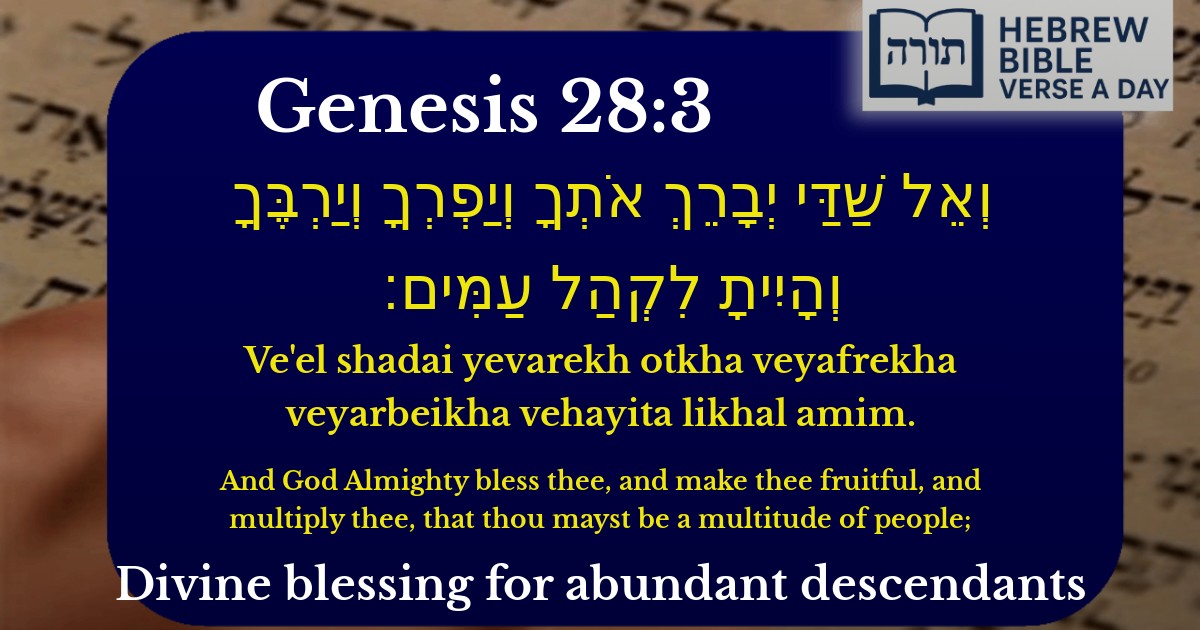Frequently Asked Questions
Q: What does 'God Almighty' (El Shaddai) mean in Genesis 28:3?
A: The name 'El Shaddai' (אֵל שַׁדַּי) is one of the names of Hashem, often translated as 'God Almighty.' Rashi explains that it means 'the One who is sufficient (שֶׁדַּי) to provide blessings.' The Midrash (Bereishit Rabbah 46:3) connects it to God's power to say 'enough' (דַּי) to creation, showing His control over the universe.
Q: Why does Isaac bless Jacob with fertility in Genesis 28:3?
A: Isaac blesses Jacob with fertility ('make thee fruitful and multiply thee') because this was a foundational promise to the forefathers—Abraham, Isaac, and Jacob. The Talmud (Yevamot 64a) discusses how the patriarchs and matriarchs initially struggled with childlessness, emphasizing that offspring are a divine blessing. This verse reinforces the covenant that Jacob’s descendants will become a great nation.
Q: What does 'a multitude of people' (קְהַל עַמִּים) refer to in this verse?
A: The phrase 'a multitude of people' (קְהַל עַמִּים) refers to the future Jewish nation descending from Jacob. Rashi explains that it hints at the Twelve Tribes, who would emerge from Jacob’s children. The Midrash (Tanchuma Vayetze 12) also connects this to the idea that the Jewish people would be gathered (קָהָל) in holiness, serving Hashem together.
Q: How does this blessing apply to Jewish people today?
A: This blessing reminds us that Jewish continuity and growth are divine gifts. The Rambam (Hilchot Ishut 15:2) teaches that having children is a mitzvah, fulfilling God’s command to 'be fruitful and multiply.' Today, Jewish families see children as a continuation of Jacob’s legacy, ensuring the future of the Jewish people.
Q: Why is this blessing given before Jacob leaves for Charan?
A: Isaac gives this blessing before Jacob’s journey to Charan to assure him of divine protection and future prosperity despite the challenges ahead. The Talmud (Megillah 17a) notes that blessings before travel are important for safety and success. This mirrors how Abraham and Isaac also received blessings before their journeys, showing a pattern of divine guidance for the forefathers.


Context of the Verse
This verse (Bereshit 28:3) appears in the Torah when Yitzchak blesses Yaakov before his journey to Charan. The blessing invokes El Shaddai (אֵל שַׁדַּי), one of the Divine Names, and contains three key elements: blessing, fruitfulness, and multiplication, culminating in Yaakov becoming a "קְהַל עַמִּים" (multitude of peoples).
Explanation of "El Shaddai"
Rashi explains that Shaddai means "He who is sufficient" (שֶׁדַּי בִּבְרָכוֹתָיו), indicating that Hashem's blessings are all-encompassing and sufficient for all needs. The Ramban adds that this Name is often associated with fertility and the fulfillment of promises, as seen in Bereshit 17:1 when Hashem establishes the covenant with Avraham.
The Threefold Blessing
Meaning of "קְהַל עַמִּים" (Multitude of Peoples)
Rashi explains that this phrase refers to the twelve tribes of Israel, each with its own distinct identity yet united as one nation. The Kli Yakar adds that "קְהַל" implies a gathering with purpose, suggesting that Yaakov's descendants will be a holy assembly dedicated to serving Hashem.
Connection to the Covenant
The Ramban notes that this blessing echoes the promises made to Avraham and Yitzchak, reinforcing the continuity of the covenant. The use of El Shaddai specifically ties this blessing to the earlier covenant in Bereshit 17, where fertility and nationhood are central themes.